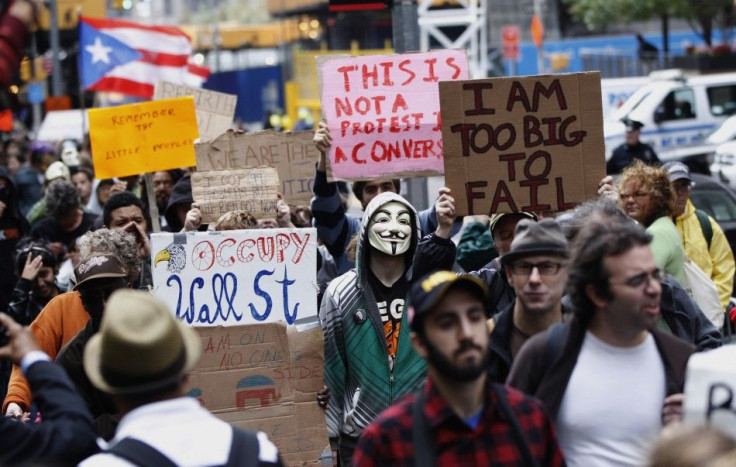Occupy Wall Street - Giving Voice to Economic Problems, or Just Hype?
ANALYSIS

Whenever a phenomenon like Occupy Wall Street, the coalition seeking economic and fiscal reform, appears, it's convenient to say that it stemmed from only one decision, Decision A, or only one mistake, Mistake B, and if either was reversed, the nation's problems would be solved.
The above is reductionism at its worst: it's inaccurate, doesn't lead to solutions, and, if allowed to dominate the political discourse, it can be disastrous for a nation.
Further, the reductionism mistake is currently being committed by critics of the Occupy Wall Street movement. Tea Party supporters, and other conservatives, argue that if only President Barack Obama is defeated, or more Republicans are elected to Congress (and more Democrats voted out of Congress) or more unions are broken up, that will be the end of Occupy Wall Street, and the nation's economic and social problems.
Wrong.
At this stage of the movement, no one can incontrovertibly predict the status of Occupy Wall Street in a year, let alone in two or three, but that is beside the point. Occupy Wall Street's existence as a high-profile pressure group or not, unless the economic and social problems that gave rise to Occupy Wall Street are addressed and corrected, the pressure will not disappear.
Underscoring, barring some unforeseen event that dramatically lowers the unacceptably high 9.1 percent U.S. unemployment rate and increases real, median incomes, the election of a Republican president and/or a Tea Party-dominated Republican Congress will not cause the nation's economic and social problems to vanish.
Occupy: A Visible Expression of An Economic Reality
Tea Party and other conservative types will no-doubt counter with, The 2012 election will solve the nation's economic and social problems because all we need to do is cut taxes on upper-income groups -- a flat tax of 15 percent would be ideal -- and cut federal spending, and the free market will solve every problem, create all the jobs we need, and lead to prosperity for all.
Nice rhetoric, the above is. But as they say in The Bronx, N.Y., Sorry, but it doesn't work that way.
The economic and social problems that gave rise to the Occupy Wall Street movement were triggered by a multitude of long-running trends that will not only not be solved by cutting taxes again for upper-income groups and/or cutting federal spending -- those two conservative proposals will make the problems worse.
Most investors / readers are aware of the free market's benefits: entrepreneurship, innovation, ingenuity, dynamism, risk taking, wealth building, a more-efficient deployment of resources, and commerce, are chief among them.
But what also has to be kept in mind is that free markets sometimes make mistakes, get things completely wrong, or move in ways that are disastrous.
Free Markets: Hardly All-Knowing, All-Correcting, All-Just
The Tea Party-dominated Republican Party fails to see this other side of free markets. In the Tea Party virtual-reality world, the free market is perfect, self-correcting, and self-regulating.
Further, some of the most respected economists of our era -- Paul Krugman, Martin Wolf, and Nouriel Roubini among them -- all agree that, if anything, the United States needs to pass a large jobs program / infrastructure stimulus bill, and both re-tool and broaden its social safety net to include more education grants to promote workforce retraining -- to address the economic and social problems.
In other words, the United States has about a $1.5 trillion output gap -- the difference between the U.S. economy's capacity and its current GDP. And it's short about 14 million. That's Fourteen-million-jobs -- an enormous job deficit. The Tea Party's/Republican Party's argument that cutting taxes on upper-income groups and/or cutting federal spending would not only not eliminate output gap, it would increase the gap!
Likewise with the Tea Party's/Republican Party's proposal for the social safety net: they would shrink Social Security, Medicare and probably would repeal the 2010 U.S. Health Care Reform Act intended to provide universal health insurance, if they took control of the White House and Congress in 2012 election. And the Teas' probably would not be receptive to increased federal funding for workforce retraining and education.
But there again, Krugman, Wolf, Roubini, et al argue that regarding the social safety net, the United States needs to do the exact opposite, and it's not some idle liberal thought.
The long-term, secular trends of globalization, automation, and the decline in unionization already demonstrate -- and will continue to demonstrate via intensifying economic and social problems -- that the United States must create a smarter, more-encompassing social safety net. No flat tax or additional tax cut for upper-income groups or move to further cut federal spending will blot-out or somehow end these long-term, secular trends of the modern and now postmodern era.
In sum, the U.S.'s economic and social problems are there, Occupy Wall Street headlines or not.
--
See Also: To Read More News Stories and Analyses Regarding Occupy Wall Street: click here.
© Copyright IBTimes 2024. All rights reserved.





















